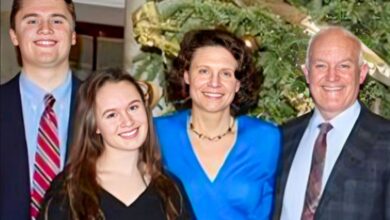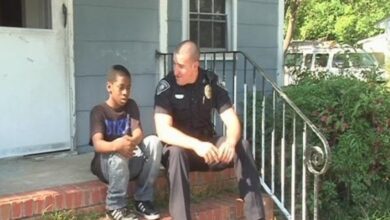The Unbreakable Spirit of Lainie Jones
Lainie Jones’s story began when she was barely a toddler. At just 18 months old, she was diagnosed with adrenal cancer, forced into a battle most people will never know in a lifetime. That moment marked the start of a lifelong struggle with a disease that would return again and again in different, devastating forms.
As the years went on, new diagnoses followed her like shadows. She faced breast cancer, thyroid cancer, melanoma, sarcoma, and even lung cancer. Each time she thought she had cleared one hurdle, another one appeared. Now, facing her seventh cancer diagnosis, she has proven that the human spirit can endure almost unimaginable trials.
After her fourth cancer, genetic testing revealed that she carried Li-Fraumeni syndrome, a rare disorder that drastically increases the likelihood of developing multiple cancers throughout life. For many, such news would bring despair, but for Lainie it became both a burden and a roadmap. She understood more than ever the need to monitor her health closely and encourage others to do the same.
She began calling herself “the early detective,” a reminder that early detection can be the difference between life and death. Her mission became clear: to show others that watching your body carefully, noticing the smallest changes, and not ignoring your instincts could save lives. In her words, cancer doesn’t deserve the spotlight—what deserves attention is our ability to face it early and fight back.
One of her most striking examples was her battle with melanoma. Caught early, it was treated successfully, proving that vigilance works. She uses that experience to encourage others not to delay checkups, to take their health seriously, and to embrace prevention as power. Each diagnosis, while devastating, has been turned into a teaching tool by Lainie.
Today, she continues her fight in Houston, Texas, where she is undergoing treatment for glioblastoma at the MD Anderson Cancer Center, one of the most advanced cancer hospitals in the world. Radiation sessions consume her days, yet she greets the process with the same unshakable resolve that has defined her life since childhood.
Because of her condition, she and her husband JJ have faced significant financial strain. JJ’s sudden job loss added further stress to an already overwhelming journey, leading the family to launch a GoFundMe page. Strangers from all over the world have contributed, offering not only financial help but also emotional support in her ongoing battle.
But Lainie’s mission is larger than her personal survival. She has chosen to turn her adversity into advocacy. She speaks openly about the importance of genetic testing, especially for families with a history of cancer. By telling her story, she pushes others to take control of their health before it’s too late.
Her presence online has become another form of outreach. Through her Instagram account, she documents her journey with humor and raw honesty. She laughs at cancer, makes light of hospital routines, and transforms her suffering into something relatable and even uplifting. This approach allows her to connect with thousands who draw courage from her resilience.
She consistently reminds people that being proactive is not optional—it is essential. Early screenings, regular checkups, and paying attention to family history are all part of the message she repeats. Her credibility comes not from theory but from lived experience, and that makes her words impossible to ignore.
MD Anderson has become not just her hospital but a second home. Surrounded by top specialists, she benefits from the most advanced treatments available. Yet what defines her there is not only medical science but also her ability to inspire the staff and patients who meet her.
Living with Li-Fraumeni syndrome means constant vigilance. Every three months, Lainie undergoes extensive scans and tests to catch new threats early. The frequency of these checkups reflects the seriousness of her condition, but also highlights the discipline and courage required to keep going despite the fatigue of endless medical appointments.
Her illness reshaped her career and her sense of purpose. At one point, she dreamed of becoming a nurse, but her repeated battles with cancer redirected her life. Instead of treating patients in a hospital, she now supports cancer research and advocacy efforts, raising awareness and funds for causes close to her heart.
Her outlook has always been remarkable. Even as cancer returned time and again, she chose laughter and optimism as weapons. She refers to her journey as “dancing from one diagnosis to the next,” a phrase that reflects both her humor and her defiance. By sharing her struggles with such honesty, she reduces fear and empowers others to act.
What shines through most is her ability to transform pain into inspiration. She is not only surviving; she is teaching. She is proof that hope, faith, and community support can sustain a person through the darkest times. Her story is not just about one woman’s battle with cancer—it is a reminder that resilience, love, and early action can give all of us a chance to fight back.





